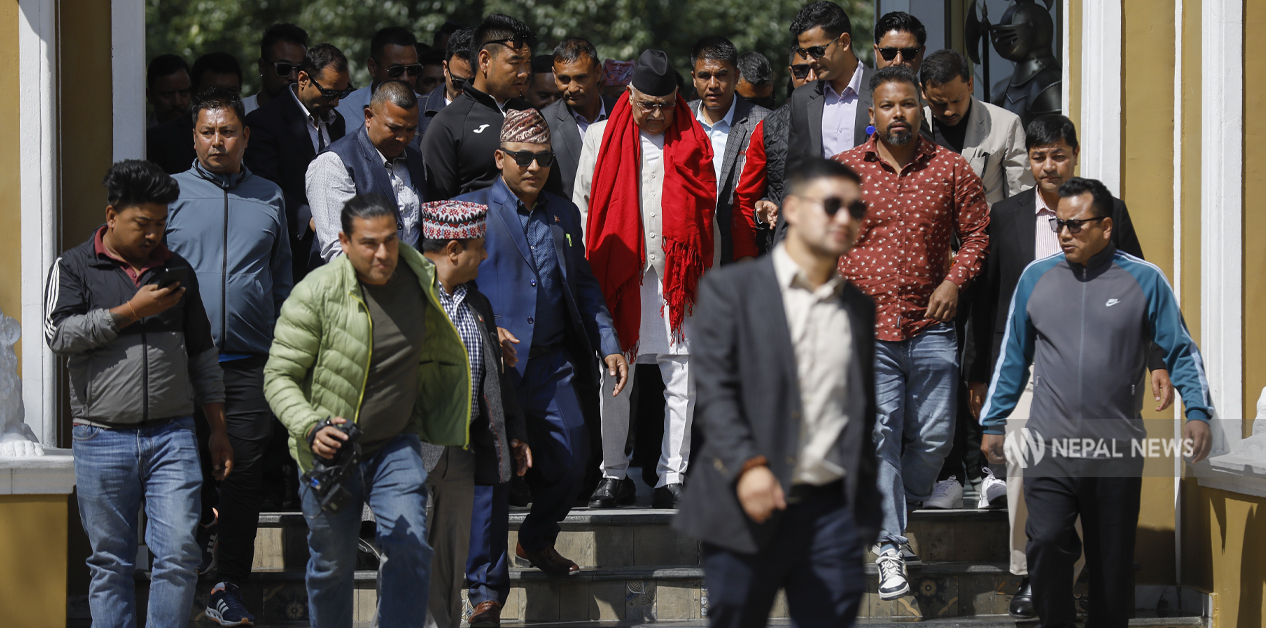

CPN (UML) Chairman KP Sharma Oli, who was overthrown from power by the ‘Gen Z revolt’ on September 8 and 9, has consistently characterized the incident as the result of a ‘conspiracy’.
Continuously questioning the role of security agencies in the two-day incident, UML leaders often express the view that the party must be prepared in this manner to handle sudden incidents.
Starting the UML Central Committee meeting at a party palace in Lalitpur on Wednesday, Chairman KP Sharma Oli said the party must learn from the September 8 and 9 events and build a party capable of stopping such incidents.
“Even the party itself was not prepared for that kind of thing. The current necessity is to prepare for any such situation. Such sudden things can happen, and even a small matter can escalate. They were trying, and we thought we could stop it,” said Chairman Oli. During his address, Chairman Oli did not elaborate in detail on what kind of structure would be created to protect against the Gen Z revolt. However, deep dissatisfaction and distrust towards the security agencies are frequently heard among UML leaders.
On one hand, they express discontent over the shooting that killed youth and students on September 8, while on the other, they criticize the security agencies for failing to protect government and private property on September 9.
UML Chairman Oli has stated that he only learned of the shooting after the youth and students were killed on September 8. On September 11, UML General Secretary Shankar Pokharel and Deputy General Secretary Pradeep Gyawali issued a statement demanding a review of the security agencies’ role.
“Despite the organizers’ prior announcement that the demonstration would be peaceful and their clear statement that they had no involvement, how and by whom were such destructive and devastating incidents carried out? A thorough investigation into this is essential. The role of the state’s security agencies during this process must also be reviewed,” they said in the statement.
UML Standing Committee member and former Home Minister Khagaraj Adhikari made a serious accusation that the heads of the four security agencies were “sold out.” He said, “I don’t know whether I should say this or not. The people in all four branches of these security agencies were sold out.”
Adhikari, who is also the former Chief Minister of Gandaki Province, is considered close to Chairman Oli.
Prime Minister Oli, who disregarded the suggestion given by the heads of the security agencies that the movement had gone out of control, resigned only when the protesters came to encircle the government residence, Baluwatar.
Immediately after, the army took Oli to a safe location by helicopter. Oli stated that a delay of just 5 minutes in leaving Baluwatar could have cost him his life.
Ten days after the movement, Oli, who came out from the army’s security cordon, has continuously complained that he did not receive anyone’s support. “They adopt various tactics to gain power in politics. We cannot say they won’t do that.”
“It was not a big deal, it could have been easily stopped through the state mechanism, but it was not. Another attempt should have been to stop it through the people’s effort. I had also said this in the meeting on the 7th. Democracy was brought not by the state mechanism but by the people,” Oli said.
Oli has compared the current situation to a class struggle and called it a counter-revolution.
“On one hand, there was a revolt by the people. On the other hand, in Oli’s view of the incident, from the bureaucracy to the security agencies, they did not agree with the Prime Minister’s policy,” says analyst Jhalak Subedi. “As a result, Oli has been expressing discontent to protect himself.”
Lately, although there is no clear plan on how to proceed, leaders close to Oli suggest moving forward by creating a mechanism similar to the Youth Force.
UML Politburo member Mahesh Basnet, who has been actively working in Oli’s defense since his removal from power, has been advocating for the preparation of a Digital Generation (DG) Force.
At a press conference held at the UML headquarters in Chyasal on October 8, Basnet, recalling the formation of the Youth Force, said, “Just as we formed the Youth Force yesterday when the morale of the police administration was low and the voice of the people was suppressed, we will form a Digital Generation (DG) Force to strengthen the voice of the people.”
The UML had activated the Youth Force against the activities of the then Young Communist League (YCL) of the Maoists, which was organized in barracks-like structures and emerged from an armed rebellion. Basnet was the head of the Youth Force, which was under the fraternal organization Democratic National Youth Association (now Youth Association Nepal).
“A few unruly Gen Z individuals walked on the streets saying this state is ours now. The government should be pressured to control them. If they start forming a militant group to resist this, then the Congress, Maoists, Gen Z, or others also have them. It would be better not to do that,” says Subedi. “They adopt various tactics to gain power in politics. We cannot say they won’t do that.”